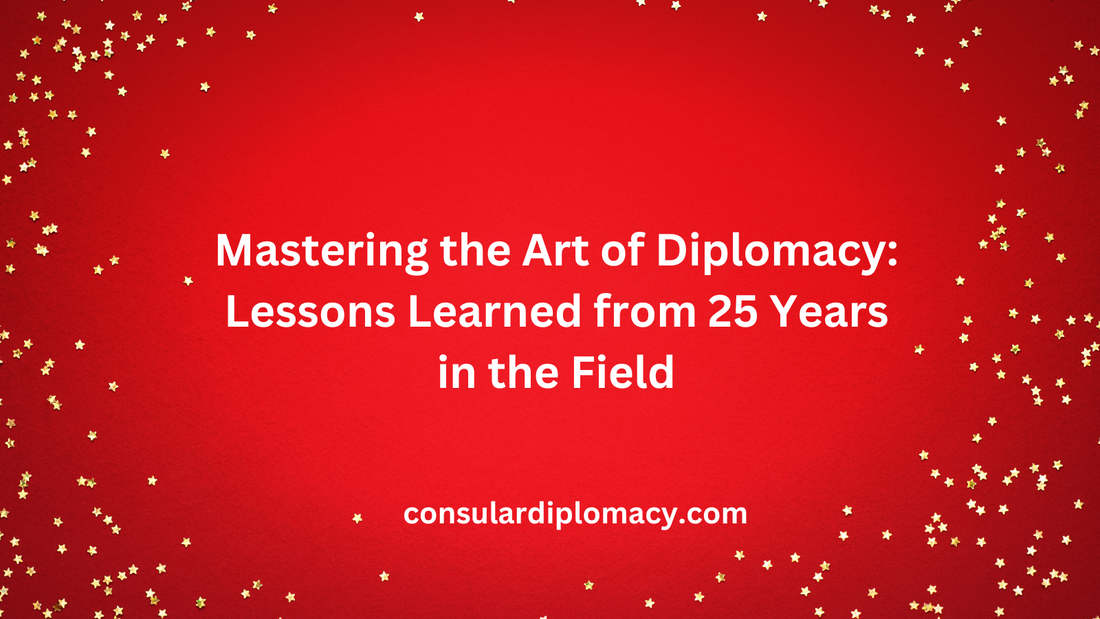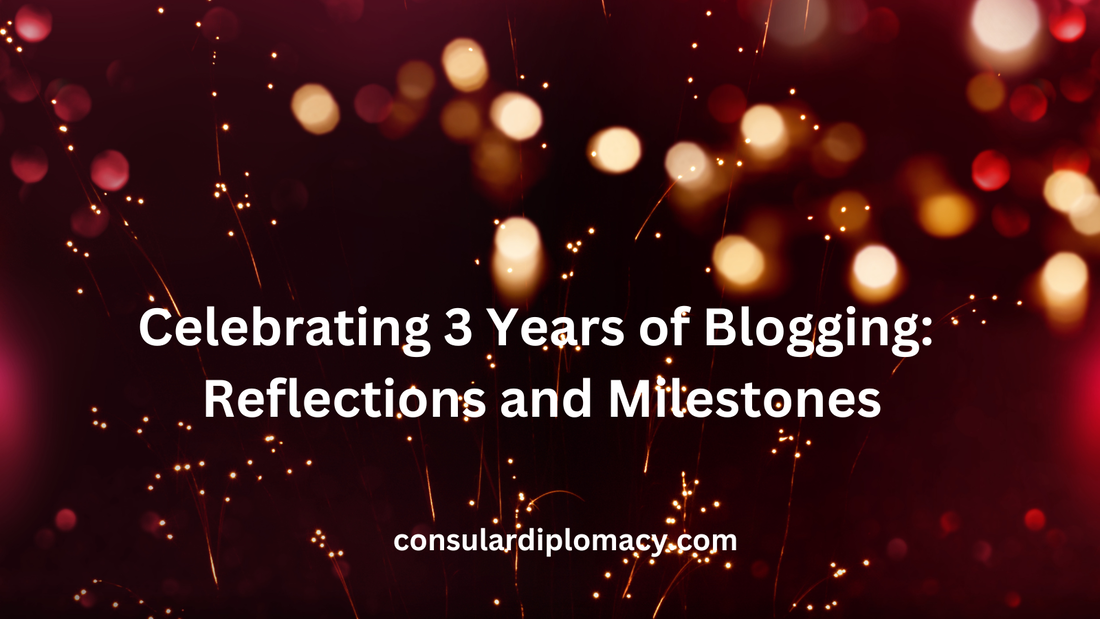 Today is an exceptional day for me. Twenty-five years ago, I joined the Foreign Service. It has been an extraordinary journey with ups and downs and amazing experiences, from meeting heads of state and representing Mexico in our Independence Day celebrations to organizing football tournaments for children and writing thousands of documents. One of the most significant rewards of my diplomatic career has been working with my colleagues, especially from the 15th generation of the diplomatic academy. Cheers to the members of my chat groups Vamos Mexico, Core Group, and Consejeros. Besides, I have been fortunate to have great bosses from whom I learned a lot throughout these years. I also had the unique opportunity to assist Mexicans abroad in distress in horrendous circumstances, including terrorist attacks, hurricanes and earthquakes, domestic violence, and more. Consular protection is where foreign policy meets people; I cherished my work in that department. While overseas, I had the opportunity to work for the Mexican community, which was a humbling experience. Mexicans abroad are the hardest-working people anywhere and some of the most patriotic people. Celebrating with them civic ceremonies and their hometowns' Saint's feast day are some of the highlights of my diplomatic career. Special thanks to the people of El Refugio, Jalisco; Sombrerete, Zacatecas; Axochiapan, Morelos; San Agustin Yaterani, Oaxaca; Las Margaritas, Chiapas; and many more towns across Mexico. I joined the foreign service during the tenure of the first female Minister of Foreign Affairs, and I am thrilled that we have our fourth female today. However, there is still much to do to fully attain gender equality and inclusion of other groups. The world has changed a lot since 1998. The digital revolution is pushing forward, regardless of its impact on society, government, and people. With the arrival of Generative AI, we are beginning another disruptive era. Diplomacy has also moved forward. Terms such as Tech and Digital diplomacy did not exist when I started my diplomatic career. Besides, while public diplomacy was disappearing in the US, it was exploding elsewhere, giving a new push for studying diplomacy. In recent years, there has been a boom in diplomatic studies, bringing perspectives from the Global South, thus moving slowly away from a Western-centric lens. Consular diplomacy as a field of study did not exist in 1998. However, the combination of lower transportation costs, the information and communications technology revolution, and the socialization and societization of diplomacy gave way to the rise of consular affairs as a priority to not only the ministries of foreign affairs but also politicians, the media, and the public. In my blog post, Consular Diplomacy bibliography LINK, you can find a list of books, essays, and documents on the subject. Nowadays, my focus is learning about the impact of technology, especially artificial intelligence. You can check out my series on Diplomacy 4.0, including the following posts:
I am looking forward to what my diplomatic career will take me next, but I am always ready to learn new things. DISCLAIMER: All views expressed on this blog are that of the author and do not represent the opinions of any other authority, agency, organization, employer or company.
0 Comments
 Today is the third anniversary of my blog. As I mentioned in the second-anniversary blog post, it has been a roller-coaster ride with tremendous ups and a few downs. Three years does not seem a lot of time, but many things have changed, for better or worse. I started the blog in September 2020, when the world was closed due to the pandemic. However, significant efforts were made to find a vaccine, thus allowing the world to reopen slowly, even after a series of surges generated by new variants of the virus. For a few years, the world, especially the great powers, has slowly turned economic, financial, data, and people exchanges into geopolitical weapons. To learn more, check out the great work The Power Atlas: Seven battlegrounds of a networked world. Some scholars state that a new era of deglobalization is moving forward as more countries build barriers to the free flow of trade, data, services, and people. The securitization of the economy, particularly semiconductors, critical minerals, and digital technology, is impacting the whole planet. The disruption of Generative Artificial Intelligence (AI) and the exponential race to launch the system that could be the winner has turned the world upside down. There is not a day when a new large language model is not released that supposedly will outperform all others. Students and teachers struggle to find the right approach to using AI, while many workers feel that machine learning will take their jobs and livelihoods. Even though many have asked to pause the development of AI, the race is growing exponentially while governments, societies, and people are trying to make sense of it and find the best approaches to regulate it. An interesting turn is the great concern of AI´s ethics. I clearly understand the worries about making AI work ethically. However, that level of concern about ethical behavior is not shown when talking about humans, governments, and organizations. Why do we not ask for ethical regulations of politicians and governments? Is fighting discrimination in the real world easier than in the digital realm? Three years ago, zoom diplomacy, vaccine diplomacy, and AI diplomacy were brand new terms. Today, even after the reopening of the world, most of the meetings worldwide are being held online, saving money and time but missing the human connection. Digital nomads have turned the globe into their offices, and many people have yet to return, if they ever do, to an office building. Nowadays, diplomacy might be living its fifth evolutionary tipping point, with the confrontation between traditional views of sovereignty and innovative forms of global governance (Neumann, 2020). The big problem is that time is running out, particularly regarding climate change. Just read the headlines this summer regarding the scorching temperatures worldwide. In terms of public diplomacy, the changes in the last years have been difficult to adjust. The transformation of Twitter into something else impacts the digital strategies of many countries, especially for basic accounts. Closing the door of data for research purposes is making it more challenging to listen and engage with audiences. The arrival of deep fakes, like Pope Francis wearing a puffer white jacket, is affecting the credibility of social media, reducing opportunities for governments to engage with foreign audiences. Disinformation is breaking havoc and helping radical views of people, politicians, and governments, making it more difficult to find common ground and collaborations. Regarding consular diplomacy, the pandemic pushed it into the forefront of every ministry of foreign affairs. Foreign ministers and public servants at home, ambassadors, diplomats, and consular officers overseas all work together to help stranded citizens abroad while countries close their borders. Many MFAs are still struggling to meet the demand for documentary services, as the backlog of visas, passports, and other consular documents has not been solved. Lately, there has been a growing amount of research on consular diplomacy, but the field has not yet matured. Many studies have identified consular services as a prime target for using AI systems to manage them. Despite the challenges that humanity confronts today, blogging has been a great experience that has opened the door to things I would not have thought of. Here are some of the milestones that I have achieved in the last three years of having my blog:
I am optimistic that the next three years will be better than the last, maybe just because we are reaching a breaking point. But also because people worldwide want a better future for themselves and their children. Neumann, I. B (2020). Diplomatic tense: A social evolutionary perspective on diplomacy. Manchester Univesity Press. Experimenting with AI Below is a list created by generative AI about the significant milestones of diplomacy in the last three years. Do you agree with the results? Prompt: You are a professor of diplomatic studies. Identify the major changes in the practice of diplomacy that have occurred since January 2020, giving a brief description and using bullets. Please be specific and concise. Bing.chat (creative mode) response: Some of the major changes in the practice of diplomacy that have occurred since January 2020 are:
Bard by Google: Sure, here are the major changes in the practice of diplomacy that have occurred since January 2020:
Perplexity Major changes in the practice of diplomacy since January 2020 include:
Overall, the changing nature of diplomacy in the 21st century requires sustained attention and adaptation to meet the challenges of today and tomorrow. DISCLAIMER: All views expressed on this blog are that of the author and do not represent the opinions of any other authority, agency, organization, employer or company. |
Rodrigo Márquez LartigueDiplomat interested in the development of Consular and Public Diplomacies. Archives
May 2024
Categories
All
|
